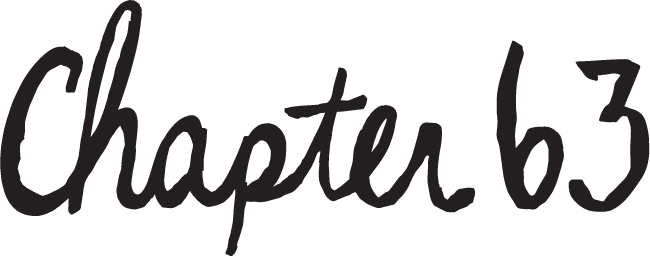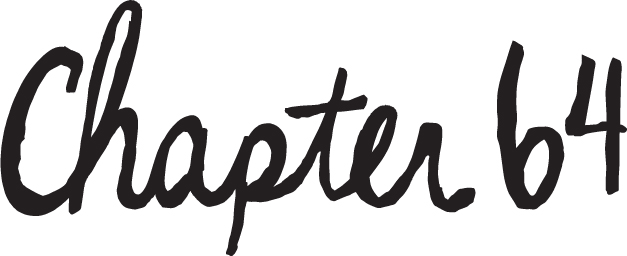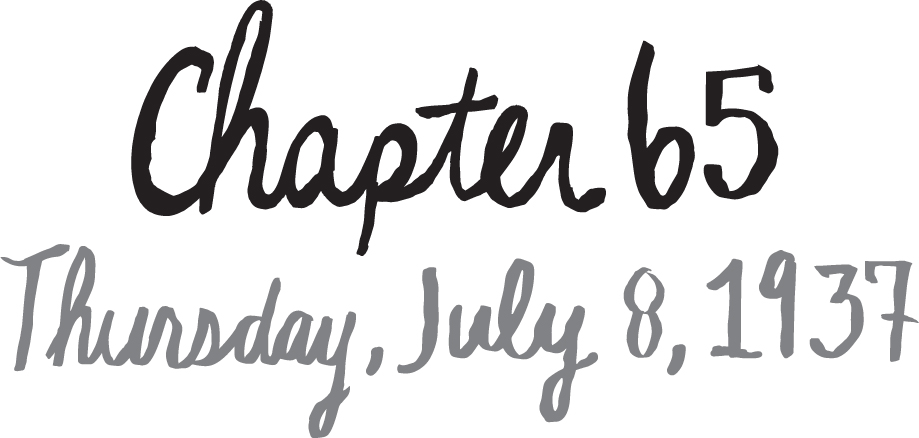The Game of Love and Death (28 page)
Read The Game of Love and Death Online
Authors: Martha Brockenbrough


A
ND
so, Death won.
The moment Flora refused Henry, even knowing the cost, Death felt it. Her senses honed themselves beneath the cover of a moonless sky. Music, car horns, small bites of conversation, laughter … the din of humanity filled her ears. And the smells … smoke and wine and flowers exhaling the last of their perfume.
All she had to do was wait for midnight. And then the hour came.
It was a shame the Thornes had discovered the business with Helen. That was inelegant. But now that the Game was over, it hardly mattered. They’d never guess her real identity, and she had no plans to return to their mansion.
She’d been recalling Love’s little book in a café, puzzling over it as victory arrived. Death was struck with the understanding that she and Love were every bit as different as she imagined and feared. It meant, as ever, that she was alone, the eternal villain.
Love inspired the stories. He wrote them down. She destroyed them and sucked them up. She was a monster. A monster with no choice. A monster who needed to feed. A monster no one wanted.
Ah, well. If she was cursed to be the monster, she would be the worst of them. The only question remaining was when she might claim her prize. She was entitled to it anytime. She was hungry for Flora, though she wanted to hold off. It would be even more satisfying to dine on the girl’s life when the urge was sharper.
Unless …
Unless Henry chose Death.
If he did that, she could have them both. And she could prove beyond doubt the weakness of love.
And weak, it was. As often as not in Death’s vast experience, people preferred the idea of love to the act of it. They wanted to pursue, but grew weary once they’d won the prize. If they were loved, they used it as proof of their worth. In the name of love, they manipulated each other. Out of cowardice, they lied, overtly and by omission. There were so many ways for love to decay. And unlike the decaying of a corpse, which fed worms and grew trees, what did rotting love ever feed?
Love believed Henry loved Flora. He believed in his player’s perfect heart. Death believed no such thing. She suspected Henry loved the idea of being loved and the security that came with it. She would hold off consuming Flora until she’d won Henry as well.
She’d already won the Game as herself. There could be no greater victory than winning as Love too. She transformed her guise into something Henry would not be able to resist. And as she traveled toward him, she felt better than she had in ages.

A
FTER
Henry disappeared, Flora remembered she was still wearing his coat. For the longest time, she waited in the column of light as the night closed in, expecting he’d return — if not for her, then for his jacket.
She’d even hoped he would, although she did not trust a single thing she felt. How could she, knowing Death had chosen her as a player when she was a baby in an apple crate? And of course she’d been Death’s choice. That she would have been chosen by Love was unthinkable. Her parents had died on Valentine’s Day, for God’s sake. When it came to love, her entire line had been cursed.
Henry did not return. The night grew cool. She checked her watch. Just after midnight. The day had become another, without fanfare, unlike that other midnight she’d spent with Henry, when bells chimed and everything felt so magical. And then, moments later, she’d found Nana’s body. The sadness rang in her bones once more, heartbreak’s echo.
Suddenly cold, she put her hands in the pocket of his jacket. There was paper there. Torn strips of it. She pulled one out and read it.
Someday we will climb the Eiffel Tower.
With a pang, she recognized Henry’s handwriting. Paris. She could go there on her own. It was where Bessie Coleman learned to fly.
Curious, she removed another strip. Another
someday
, this one about making Saturday breakfast in their small green house. She looked at her watch. The band would be in full swing right now, with or without Henry, because that was what happened in life. It went on.
She pulled out another note. She opened it and began to weep. She could not read about the children she would not have.
Flora read every note until she reached the last one, a series of secret messages that meant the same thing as the heart Nana had sewn into all those quilts.
Someday starts now
, it read.
You couldn’t write something and make it true, not on a piece of paper, not with a sheet of music. At best, it would just give you something to want that you couldn’t have. The strength of a father. The warmth of a mother. The devotion of a grandmother. Love was loss. Flora had known that since …
She stopped herself midthought.
She’d known it her whole life. It was the one thing she was certain of. That someday, everyone she loved would die. Everything she loved would crumble to ruin. It was the price of life. It was the price of love. It was the only ending for every true story.
This was the certainty Death had given her. This. Not love.
The love she’d felt for music, for flying, for her parents, for her grandmother, and most of all for Henry? That was real, and it came from within, in whatever mysterious way love arrived.
Game or no, she would someday die, as all living beings did. But that wasn’t the tragedy. Nor was there tragedy in being a pawn. All souls are, if not of eternal beings, then as pawns of their own bodies. The game, whatever shape it takes, lasts only as long as the body holds out. The tragedy, every time, is choosing something other than love.
That had been her whole life. And now it was too late for it to be anything different.
She ran out of the hangar, and, breathing hard beneath a sky missing its moon, she felt the words of the song he’d written for her rise in her chest. Without accompaniment, without audience, without caring about anything but feeling them to their depths, she sang out into the void, filling the darkness with everything she’d denied herself, sending the love she’d lost to the world beyond, knowing that nothing more could hurt her worse than she’d already hurt herself.
“You are the moon and I am the sea,” she sang. “Wherever you are, you’ve got pull over me.”
Even with the music, she had never felt more alone. The desolation was deep enough to drown in.
Henry would never want her back, not after what she’d said to him. She’d ruined them. She would put the notes back into his pockets, pretend she’d never seen them, and return his jacket to him tomorrow, just as soon as she’d taken Helen on her flight. Or, better. She’d ask Helen to give Henry what was his. Death could come for her now, or Death could come later. She would welcome him when he arrived. Surely what came next could not be worse than this.

I
T
took Henry hours to walk home. Even so, he couldn’t sleep. He was folding laundry when someone knocked. For a moment, Henry hoped it was Flora. She’d changed her mind. Persuaded Mrs. Kosinski to let her up, even though it was well past the hour when visitors were permitted. He pushed his hair off his forehead and glanced around his room. He tucked the stack of folded clothes away. Everything else was fine. The bed was made. His bureau, clear. His bass, looking sharp in front of the window.
He opened the door.
Helen stood in front of him, wearing a black coat and heels over an admittedly fetching red dress. She walked into the room. She pulled off her hat, her gloves, and her purse, and laid them on the center of Henry’s bed.
“Love what you’ve done with the place,” she said. “Really homey.”
He couldn’t tell if she was being serious. It was far beneath the style of living she was accustomed to.
“Helen,” he said, wondering how she’d gotten inside.
“Cat got your tongue?” She glanced at her purse and Henry knew she would walk over to it, snap it open, and pull out a cigarette. She did just that. In a way, it comforted him, knowing her so well.
“No,” he said, “it’s just that it’s late, and this isn’t the best neighborhood, and —”
“And what,” she said, after she’d lit a match and taken a drag. “Blow this out, would you?” She held the match toward him. It burned close to her long white fingers.
Henry leaned forward and blew. The look in her eyes was strange, and she seemed nervous. “Are you all right?”
“I just wanted to see you,” she said. “Tell me you’ve missed me. It’s dull spending time with only Annabel.”
He looked around the room, wishing he had a chair. “Would you like to sit? I can only offer you the bed, unfortunately.”
She stretched out on it, kicking her shoes to the floor. Henry’s pulse sped up. She looked down at the empty spot on the blanket next to her, patting it with her free hand.
“Let me get you something for the ashes,” Henry said, pretending he hadn’t noticed her invitation.
“Henry.” Her voice was a warm purr. She exhaled smoke through her red lips. Despite himself, he felt something radiate from his center outward. Flora didn’t want him. Not the way he wanted her. And here was Helen, the girl who’d once been intended for him, making herself astonishingly available. She’d even helped Flora on his behalf. Maybe choosing her made sense after all.
He had nothing for the ashes but a nearly empty drinking glass. He drained it and wiped his lips with the back of his hand. He offered Helen the glass. As she took it, their fingertips touched and Henry found himself on the bed next to her, trembling and dizzy. Her back was to the headboard and he faced her, his hand brushing the silk of her dress and the thigh it concealed. He looked down, blushing fiercely.
“Henry.”
Her voice was a lethal whisper. He froze in the sound of it. “I could talk to Ethan’s father for you. Get him to give you a second chance.”
A second chance. Would he receive a third? He knew what Helen was offering, what it would cost. There were worse bargains to be made. He leaned toward her, just an inch. He hoped she couldn’t see that he was shaking. He caught a whiff of her perfume. Lilies. It brought him back to his father’s funeral and the misery of it. He stood, feeling wobbly. Helen looked up at him, her eyes pleading.
“Henry.” She said his name again. She reached for his hand. But he did not take hers.
“What is it?” she asked. “Why don’t you want me?”
Henry felt sad for her. Her expression was one of open need, of hunger almost. He recognized himself in it. But she was not the one he wanted, and as much as he craved the touch of another, his heart had been built for Flora alone. The more time he spent with Flora, the more time he watched her sing, the more he understood the love she had for her airplane, the less he could imagine life with anyone else. If he could not have her, he did not want anyone.
For the longest time, he stood there, breathing and looking down at Helen, who had closed her eyes.
“I’m sorry,” he said.
“Don’t be,” Helen said. Her tone changed suddenly, in a way he did not fully understand. There was a petulance to her, the sort he used to experience in elementary school with the kids who couldn’t stand to lose at games. “The loss is yours.”
She crushed her cigarette on the edge of the glass and dropped the smoking remains inside. She set the glass on the bureau, smoothed her dress, and stepped back into her shoes.
“Help me with my coat?”
Relieved to be giving her something she wanted, he slid it up her arms and over her shoulders. She stood close, and he knew that in refusing her now, he was refusing her forever. She would not be a path to reconciliation with his old life. She would not be the cornerstone of a respectable, plentiful future.
But this choice: It wasn’t one he’d made in haste in the middle of the night. He’d made it long ago. It was Flora. It always had been. It always would be.
Even if she did not want him, she had to live. He would not let Death take her, not without a fight. At first light, he would visit James Booth, who might be able to help. At the very least, he might reveal Death’s identity. The thought terrified him. But what choice did he have? If this Death character was not a man he could fight, perhaps he was someone who would consider taking Henry’s life in trade.
Helen slipped her hands back inside her gloves and laid a hand on Henry’s cheek, firmer than a gentle touch but something short of a slap.
“See you around, Henry,” she said.
“Let me walk you to the door,” he said.
“No need.” She nudged the tumbler off the dresser. It shattered, sending fragments of glass and ash across his floor. “So sorry.” Though she didn’t sound it.
Henry went to his closet, where he kept a broom and dustpan. By the time he turned around, she was gone. Henry peered into the dimly lit hallway, puzzled at her disappearance. Exhaustion set in. He cleaned up the glass and staggered to his bed, which smelled of her. Nonetheless, he fell into a deep, dreamless sleep, the sort said to be enjoyed by the dead.
He woke with a start the next morning, anxious to find his way to Hooverville. But when he looked out the window to see what sort of day he faced, he spotted Mr. Thorne’s car parked across the street from the boarding house. It was so early, and yet, how long had he been there?
The color drained from Henry’s face, the feeling from his hands. This was the last thing he needed. He did not want to be berated about any of his choices. Nor did he know anything about what had made Ethan enlist; even the prospect of speculating about that felt disloyal at best.
If he used the back door, he might slip out undetected. He tried, but one of the risers squeaked, and Mrs. Kosinski met him at the bottom of the stairs.
“I’ve a bone to pick with you,” she said. “No visitors before nine o’clock. The policy is as clear as day.” She pointed to a framed cross-stitch on the wall. Henry found it impossible to argue with a policy that had been sewn in green thread. He wondered for a moment how Helen had made it in so late, but he didn’t have time to puzzle that one through, not with Mr. Thorne waiting.
“I’m sorry,” he said, realizing that Mr. Thorne had probably barged into the place and demanded to see him whenever he’d arrived. “It won’t happen again.”
“He won’t tell me who he is or what he wants with you,” she said. “And he refuses to leave. It’s almost as if he doesn’t give a whit about cross-stitch.”
Henry started to apologize, but she wasn’t finished.
“I think he’s a gangster. Is he a gangster? What would a gangster want with you? I didn’t offer him any coffee, because I don’t want gangster lips on my good Haviland. Are you in trouble with gangsters, Henry? Because that is also against the rules, even though I haven’t yet had time to work it up in thread.”
“He isn’t a gangster.” Henry had to smile at that, just a bit. Mrs. Kosinski had closed the French doors, but through the lace curtains, Henry could see Mr. Thorne sitting on the edge of the couch, his hat in his lap. He had the sort of profile that should be carved in stone.
“Should I bring coffee, then? Made with fresh grounds?” She firmly believed you could use coffee two to three times before the beans were spent.
“That would be nice. Fresh grounds.”
“I’ll add it to your weekly bill,” she said. “Coffee costs extra, of course. So does cream and sugar.”
“Bring us everything,” Henry said, mostly wanting her to be out of the blast zone when Ethan’s father blew up.
“Biscuits? Because —”
“Everything,” Henry said. He walked toward the French doors. Mr. Thorne rose, still holding his hat. When Henry noted the man’s pallor, his heart lurched. He opened the door, knowing terrible news awaited.
“What is it?” he said. “What’s happened? It’s not Annabel, is it? She didn’t fall off her bicycle —”
“It’s Helen,” he said. “Something terrible has happened. It seems we’ve all been fooled, and I thought it only right to warn you.”